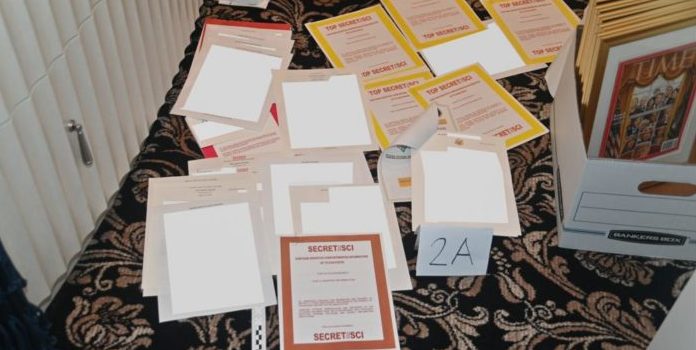(Headline USA) A federal appeals court on Wednesday permitted the Justice Department to resume its use of classified records seized from former President Donald Trump’s Florida estate, Mar-a-Lago, as part of its ongoing criminal investigation.
The injunction issued earlier by U.S. District Judge Aileen Cannon, which also permitted the appointment of a special master to review claims of executive and attorney–client privilege in the thousands of documents seized during the Aug. 8 raid, had been seen as a major repudiation of the Justice Department’s tactics in what critics have labeled a politically motivated stunt.
However, Trump’s legal team has been somewhat reticent in presenting any evidence to support the assertion that roughly 100 of the documents stamped with high-level classification markings were, in fact, declassified. It has said that doing so would tip its hand to a possible defense strategy even before charges were filed.
“If you’re the president of the United States, you can declassify just by saying ‘It’s declassified.’ Even by thinking about it…You’re the president, you make that decision,” Trump claimed in a Fox News Channel interview recorded Wednesday before the appeals court ruling.
The ruling from a three-judge panel of the U.S. Court of Appeals for the 11th Circuit clears the way for investigators to continue scrutinizing the documents as they consider whether to bring criminal charges over the storage of of top-secret records at Mar-a-Lago after Trump left the White House.
In lifting a hold on a core aspect of the department’s probe, the court removed an obstacle that could have delayed the investigation by weeks, potentially delaying its politically motivated indictment of Trump until after the November midterm election.
The appeals court rejected the possibility that Trump could have an “individual interest in or need for” the allegedly classified documents.
In addition to cynicism about the politicized DOJ’s hopes of impacting the upcoming election, speculation has swirled that the documents in question may be related to the Russia-collusion hoax perpetrated in collaboration with the FBI and DOJ during Trump’s presidency.
Although Trump, during his final week as president, formally announced his intention to declassify all related documents, it was unclear whether his own Justice Department, implicated in the scandalous conspiracy, had complied.
However, the appeals panel agreed with the Justice Department’s concerns that its investigation had been impeded, and national security concerns swept aside, by Cannon’s order that temporarily barred investigators from continuing to use the documents in its inquiry.
“It is self-evident that the public has a strong interest in ensuring that the storage of the classified records did not result in ‘exceptionally grave damage to the national security,’” they wrote. “Ascertaining that,” they added, “necessarily involves reviewing the documents, determining who had access to them and when, and deciding which (if any) sources or methods are compromised.”
An injunction that delayed or prevented the criminal investigation “from using classified materials risks imposing real and significant harm on the United States and the public,” they wrote.
Two of the three judges who issued Wednesday’s ruling—Britt Grant and Andrew Brasher—were nominated to the 11th Circuit by Trump. Judge Robin Rosenbaum was nominated by former President Barack Obama.
Lawyers for Trump did not return an email seeking comment on whether they would appeal the ruling. The Justice Department did not have an immediate comment.
Raymond Dearie, the former chief judge of the federal court based in Brooklyn, has been named to the role of special master and held his first meeting on Tuesday with lawyers for both sides.
The Justice Department had contested Cannon’s order requiring it to provide Dearie and Trump’s lawyers with access to the classified material. The appeals court sided with the Justice Department on Wednesday, saying “courts should order review of such materials in only the most extraordinary circumstances. The record does not allow for the conclusion that this is such a circumstance.”
The Trump team this week resisted providing Dearie with any information to support the idea that the records might have been declassified, saying the issue could be part of their defense in the event of an indictment.
The Justice Department has said there is no indication that Trump took any steps to declassify the documents and even included a photo in one court filing of some of the seized documents with colored cover sheets indicating their classified status. The appeals court, too, made the same point.
“Plaintiff suggests that he may have declassified these documents when he was President. But the record contains no evidence that any of these records were declassified,” the judges wrote. “In any event, at least for these purposes, the declassification argument is a red herring because declassifying an official document would not change its content or render it personal.”
Adapted from reporting by the Associated Press

